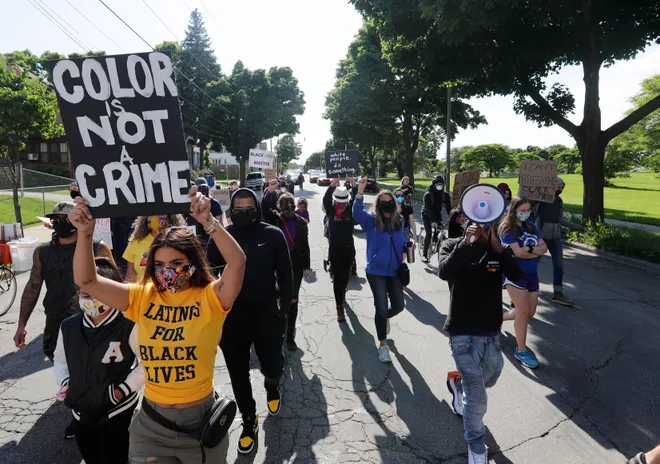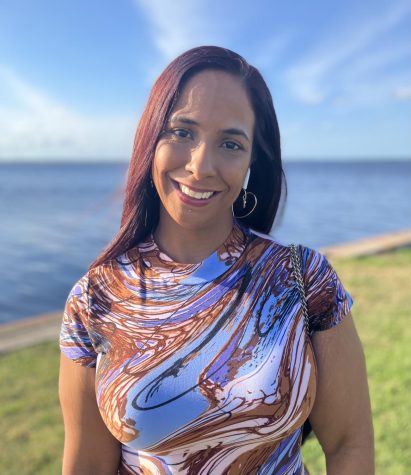Hispanic Americans Stand Against Injustices, But Feel a Lack of Support
Rick Wood via Milwaukee Journal Sentinel
Hispanic Americans unite with Black Lives Matter movement but are feeling unrecognized.
April 25, 2021
The recent deaths of George Floyd and Breonna Taylor have made it impossible to ignore how unfairly urban communities are treated at the hands of our law enforcement officers. The Black Lives Matter movement has kicked into high gear, demanding the justice well-deserved. The Hispanic community proudly stands alongside any injustices committed against anyone, but many Hispanic Americans don’t feel the same support.
Lead researcher and associate professor of education and sociology at Washington University, Odis Johnson says, “Our database analysis shows that the racial and economic demographics of the neighborhood you’re in can be a powerful factor in your odds of being killed during an interaction with law enforcement.” This means an individual is more likely to be subjected to police brutality simply because of their neighborhood. Johnson continues, “The bottom line from this latest analysis is that the demographics of the neighborhood where you live, work and walk the streets can make a big difference in the odds that a young black or Hispanic male will have a fatal interaction with law enforcement.”
A recent study in 2018 by the Washington University in St. Louis shows Hispanic men oppose a greater risk than that of black men. However, the Hispanic community is feeling overshadowed, though they are just as likely to fall victim of the same fate. Even with these recent studies showing Hispanics at a risk like the African American communities, there is little to no talk about how police brutality affects the Hispanic communities. The battle of race is often subjected to White vs. Black, leaving others in the shadows. Hispanic Americans make up 17.6% of the country’s population. According to the U.S. Bureau of Justice Statistics, 30% of arrests are Hispanics. This draws a strong question to the media and Americans everywhere: how is it possible that police brutality against Hispanics are not a topic of discussion?
Within minority communities, Hispanics are the second leading victims of police killings, next to Blacks. 16% of police-involved killings in 2016 were Hispanics.
The National Council of La Raza (NCLR) has joined forces with Voto Latino and Black Lives Matter to bring to light the attacks police have made against the Hispanic communities. Vice president of NCLR’s office of research, advocacy, and legislation Eric Rodriguez says, “Police killings of brown people often go unreported.” So why aren’t the killings of many Hispanics by police not on the forefront? Many of Hispanic-related issues are misconstrued. Immigration seems to be the largest affiliated issue within the community. NCLR’s Rodriguez acknowledges this, sharing information that 16% of Hispanics are facing immigration related issues but what about the rest of the population? He says, “as if the other 84% of the population isn’t impacted by the issue”. They are.
Angelica Erazo, VP of the Hispanic Quality of Life Commission in Austin, Tx., spoke out after the death of Mike Ramos in 2020, an unarmed Hispanic man killed by police in response to a 911 call. She called upon the Hispanic community to band together and “not leave all the heavy lifting to the black community. All too often, we do not show up when it comes to police violence and your voice is powerful and needed, too.” Congressman Jesus Garcia, who has openly opposed police using excessive force, calls for unity stating “Now is the time to stand in solidarity with our Black sisters and brothers and realize that their struggle is our struggle. Our stories are intertwined, and it is up to us to write our future legacy.”
Racism in America has been a long, on-going battle. There is no better time than now to call for action. Some Hispanic Americans may feel like this isn’t our fight. Many high profile names victimized at the hands of police are African-Americans, which can make Hispanics feel as if it doesn’t happen as often to their community. However, the statistics speak for themselves. It is important for Americans to speak out against any brutality at the hands of police. The abuse against the Black and Hispanic communities have become devastatingly common. No one should be prejudged by the color of their skin or their cultural backgrounds. It is sickening to see this is the reality for urban communities. There’s no competition. We are all united, one nation, under God, seeking liberty and justice for all.






Manuel Hernandez • Jul 15, 2021 at 7:05 pm
The only real situation where we can actually sit down together without skin color being a factor is education. The two-side political rhetoric has become a nuisance to the real common values of a quality education. In these uncertain times, a cognitively critical thought is the end result of research through a claim supported with facts, examples and statistics. While the polarized political rhetoric parades in every news media outlet and invades the webs of our two major political giants, education has been relegated to the scores of district and state standardized testing. Sensationalism has substituted reason, and the worst part of where we are now is that many academic intellectuals have also converted to the table talk of the day. Education is the key! I relocated to Kissimmee, Florida in 2014 and as a ESOL teacher took my time to study the common core and found treasures in a primarily mainstream English Language Arts curriculum. I was able to help my recently arrived students to make a connection through their own coming to America stories. Then, I taught them how to use their stories as winning scholarship essays. Today, the majority of those who became members of my afterschool club are in college and universities. While I do not undermine the issues that affect us all, I have learned that if all of us focused on making a difference in a child’s life, the issues could be managed and understood within its cultural context, but an education is “the single most powerful weapon in the world” (Nelson Mandela). John F. Kennedy said “do not ask what the government can do for you—but what you can do for the government.”